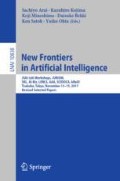Abstract
We formalize the causal component of Davis & Hara’s (2014) analysis of Japanese evidentiality, which defines “indirect evidence” as an observation of the effect state of the cause-effect dependency. The analysis correctly predicts that uttering p-youda only commits the speaker to ‘if p, q must be true’ but not to the prejacent p, and successfully derives the asymmetry between the prejacent p and the evidence source q. Also, the results of the rating study and the corpus study show that the interpretation and the distribution of evidentials are subject to the cause-effect dependencies.
Access this chapter
Tax calculation will be finalised at checkout
Purchases are for personal use only
Notes
- 1.
- 2.
The output for this paper was generated using Qualtrics software, Version 022018 of the Qualtrics Research Suite. 2017 Qualtrics. Qualtrics and all other Qualtrics product or service names are registered trademarks or trademarks of Qualtrics, Provo, UT, USA. http://www.qualtrics.com.
References
AnderBois, S.: On the exceptional status of reportative evidentials. Proc. SALT 24, 234–254 (2014)
Baayen, H.R.: Analyzing Linguistic Data: A Practical Introduction to Statistics Using R. Cambridge University Press, Cambridge (2008)
Baayen, H.R.: LanguageR. R package (2009)
Baayen, H.R., Davidson, D.J., Bates, D.M.: Mixed-effects modeling with crossed random effects for subjects and items. J. Mem. Lang. 59, 390–412 (2008)
Bates, D.: Fitting linear mixed models in R. R News 5, 27–30 (2005)
Bates, D., Maechler, M., Bolker, B.: lme4: Linear mixed-effects models using S4 classes. R package (2011)
Davis, C., Hara, Y.: Evidentiality as a causal relation: a case study from Japanese youda. In: Piñón, C.P. (ed.) Empirical Issues in Syntax and Semantics, vol. 10 (2014)
Faller, M.: Semantics and Pragmatics of Evidentials in Cuzco Quechua. Ph.D. thesis, Stanford University (2002)
Izvorski, R.: The present perfect as an epistemic modal. Proc. SALT 7, 222–239 (1997)
Kaufmann, S.: Causal premise semantics. Cognit. Sci. 37, 1136–1170 (2013)
Kratzer, A.: Constraining premise sets for counterfactuals. J. Semant. 22, 153–158 (2005)
Krifka, M.: Boolean and non-boolean ‘and’. In: Kálmán, L., Pólos, L. (eds.) Papers from the Second Symposium on Logic and Language, pp. 161–188. Akadémiai Kiadó, Budapest (1990)
Maekawa, K., Yamazaki, M., Ogiso, T., Maruyama, T., Ogura, H., Kashino, W., Koiso, H., Yamaguchi, M., Tanaka, M., Den, Y.: Balanced corpus of contemporary written Japanese. Lang. Resour. Eval. 48(2), 345–371 (2014)
Matthewson, L., Rullmann, H., Davis, H.: Evidentials are epistemic modals in St’át’imcets. In: Kiyota, M., Thompson, J.L., Yamane-Tanaka, N. (eds.) Papers for the 41st International Conference on Salish and Neighbouring Languages, vol. 18, pp. 221–263. University of British Columbia Working Papers in Linguistics (2006)
McCready, E., Ogata, N.: Evidentiality, modality and probability. Linguist. Philos. 30(2), 35–63 (2007)
Murray, S.E.: Evidentiality and the Structure of Speech Acts. Ph.D. thesis, Rutgers (2010). http://www.semanticsarchive.net/Archive/WViOGQxY/
R Core Team: R: A Language and Environment for Statistical Computing. R Foundation for Statistical Computing, Vienna, Austria (2017). https://www.R-project.org/
Sawada, H.: Modaritii. Kaitakusha (2006)
Takubo, Y.: Conditional modality: two types of modal auxiliaries in Japanese. In: Pizziconi, B., Kizu, M. (eds.) Japanese Modality: Exploring its Scope and Interpretation. Palgrave Macmillan (2009)
Acknowledgement
This research was supported by the project “Cognitive Neuroscience of Linguistic Variation in Pragmatic Inference” at the National Institute of Japanese Language and Linguistics (PI: Hiromu Sakai, Waseda University).
Author information
Authors and Affiliations
Corresponding author
Editor information
Editors and Affiliations
Rights and permissions
Copyright information
© 2018 Springer International Publishing AG, part of Springer Nature
About this paper
Cite this paper
Hara, Y., Orita, N., Sakai, H. (2018). Evidentials in Causal Premise Semantics: Theoretical and Experimental Investigation. In: Arai, S., Kojima, K., Mineshima, K., Bekki, D., Satoh, K., Ohta, Y. (eds) New Frontiers in Artificial Intelligence. JSAI-isAI 2017. Lecture Notes in Computer Science(), vol 10838. Springer, Cham. https://doi.org/10.1007/978-3-319-93794-6_20
Download citation
DOI: https://doi.org/10.1007/978-3-319-93794-6_20
Published:
Publisher Name: Springer, Cham
Print ISBN: 978-3-319-93793-9
Online ISBN: 978-3-319-93794-6
eBook Packages: Computer ScienceComputer Science (R0)

